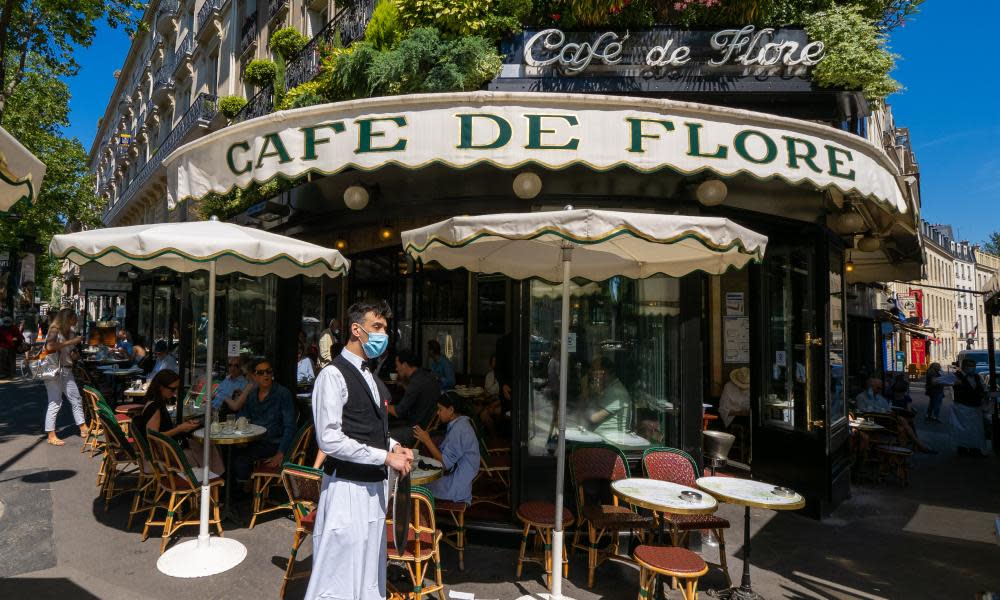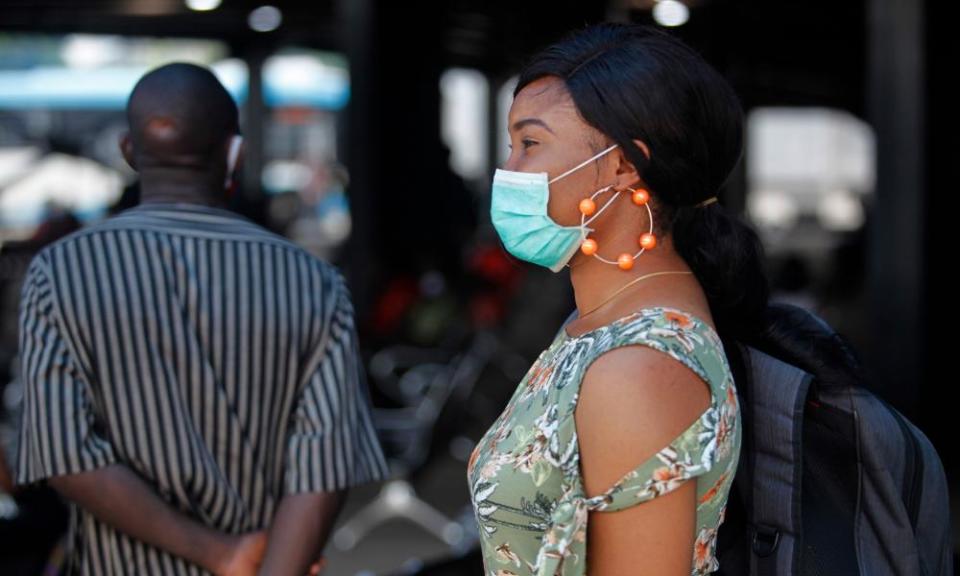Global report: Germany eases travel ban and cafe culture returns to Paris

Germany lifted its blanket European travel ban as coronavirus lockdowns across the EU continued to ease, with officials saying new cases in western Europe were now in steady decline.
Parisians reclaimed their cafe terraces and Berliners took back their bars as normal life inched closer to returning in many parts of the continent.
Germany’s foreign minister, Heiko Maas, said his government was maintaining its travel warning for non-European destinations, but from Wednesday it would issue individual advice for all Schengen-zone countries to allow holidaymakers to decide where they could safely travel this summer.
In the French capital, contented customers sat outside cafes in the French capital and sipped their morning espressos for the first time in 11 weeks, while bars, casinos, fitness studios and dance schools all reopened in Germany’s biggest city.
Epidemics of infectious diseases behave in different ways but the 1918 influenza pandemic that killed more than 50 million people is regarded as a key example of a pandemic that occurred in multiple waves, with the latter more severe than the first. It has been replicated – albeit more mildly – in subsequent flu pandemics.
How and why multiple-wave outbreaks occur, and how subsequent waves of infection can be prevented, has become a staple of epidemiological modelling studies and pandemic preparation, which have looked at everything from social behaviour and health policy to vaccination and the buildup of community immunity, also known as herd immunity.
Is there evidence of coronavirus coming back in a second wave?
This is being watched very carefully. Without a vaccine, and with no widespread immunity to the new disease, one alarm is being sounded by the experience of Singapore, which has seen a sudden resurgence in infections despite being lauded for its early handling of the outbreak.
Although Singapore instituted a strong contact tracing system for its general population, the disease re-emerged in cramped dormitory accommodation used by thousands of foreign workers with inadequate hygiene facilities and shared canteens.
Singapore’s experience, although very specific, has demonstrated the ability of the disease to come back strongly in places where people are in close proximity and its ability to exploit any weakness in public health regimes set up to counter it.
What are experts worried about?
Conventional wisdom among scientists suggests second waves of resistant infections occur after the capacity for treatment and isolation becomes exhausted. In this case the concern is that the social and political consensus supporting lockdowns is being overtaken by public frustration and the urgent need to reopen economies.
The threat declines when susceptibility of the population to the disease falls below a certain threshold or when widespread vaccination becomes available.
In general terms the ratio of susceptible and immune individuals in a population at the end of one wave determines the potential magnitude of a subsequent wave. The worry right now is that with a vaccine still months away, and the real rate of infection only being guessed at, populations worldwide remain highly vulnerable to both resurgence and subsequent waves.
There were, however, strict rules: Parisian bars and restaurants have been given permission to sprawl across pavements but tables must be a metre apart. In the rest of France, customers can now be served inside while maintaining the same distance.
In Berlin, gyms must guarantee a 3-metre distance between customers, while bars can only serve at the table, not the counter. Customers in most establishments must give their name and phone number so they can be contacted in case of infection.
In a further easing of restrictions in France, all travel curbs inside the country were lifted and sunbathing was allowed once again on beaches. But the country faces tough times, with the economy forecast to shrink by 11% this year, according to the finance ministry.
France’s Covid-19 tracking app, StopCovid, was due to be released at midday but was delayed by technical issues. The app, developed independently of Apple and Google, should allow anyone diagnosed with Covid-19 to warn those with whom they have been in contact in the previous two weeks so they can be tested.
The World Health Organization said new cases of Covid-19 were falling steadily in western Europe but rising in hotspots in Russia and eastern Europe. Russia, where deaths exceeded 5,000 on Tuesday, announced a $72bn recovery plan to over the next two years.
In Italy, the president, Sergio Mattarella, warned on the country’s national day that, contrary to some recent statements, the coronavirus crisis “is not over, and institutions and citizens alike will still have to face its consequences and trauma”.
Speaking a day after Alberto Zangrillo, the head of Milan’s San Raffaele hospital, caused a furore by claiming the virus no longer existed in Italy, Mattarella said it would be “unacceptable and unforgivable to squander this legacy of sacrifice and pain”.
Underlining the risk of local spikes in infections as restrictions ease, authorities said gatherings of extended families in the city of Göttingen, north-west Germany, two weekends ago had led to 68 people contracting the virus and 300 ordered to self-isolate for 14 days.
Spain’s health ministry has reported no new Covid-19 deaths for a second consecutive day. However, it also said there had been 34 deaths across the country over the past week, leading to some confusion.
Fernando Simón, the head of Spain’s centre for health emergencies, said the death figures were “yielding some problems” but added that the numbers were provided by the country’s regional governments. To date, the country has registered 27,127 deaths and 239,932 cases.
Worldwide, coronavirus has infected more than 6,300,000 people, according to Johns Hopkins University trackers, and killed more than 375,000.
A group of more than 230 former world leaders, global health experts and economists called on the G20 to convene an urgent summit to provide a “strongly coordinated global response” to what they described as an unprecedented global crisis.
Noting poorer countries were most at risk, they demanded the developed world release 76 countries from debt payments, double the World Bank’s emergency aid fund and honour billions of dollars committed to Covid-19 vaccine efforts.
“The consequences of not acting now would be felt for the rest of the decade,” said the signatories, who included the former UK prime minsters Tony Blair and Gordon Brown, Helen Clark of New Zealand and the ex-UN secretary-general Ban Ki-moon.

In other developments:
Sweden recorded 775 more confirmed cases of coronavirus and 65 more deaths, according to its public health agency.
The number of new jobseekers in Spain in May was close to 27,000, roughly 10 times lower than in March and April, the labour ministry said.
The number of confirmed cases in Africa passed 150,000, according to the Africa Centres for Disease Control and Prevention, with 4,344 deaths.
Iran recorded its second-highest number of new coronavirus cases since its outbreak began, with 3,117 people testing positive in the past 24 hours.
At least 20 journalists have died from Covid-19 in Peru, Latin America’s worst hit country after Brazil.
Hong Kong’s annual candlelit vigil for those killed in China’s 1989 Tiananmen Square crackdown has been banned for the first time.
A 71-year-old man has become the first Rohingya in the vast refugee camps in Bangladesh to die from coronavirus.
In Wuhan, China, where the virus originated, tests on almost 10 million people over the past two weeks uncovered only 300 asymptomatic carriers.
Hu Weifeng, a Wuhan doctor who worked with the whistleblower Li Wenliang died of Covid-19 last week, state media reported.


